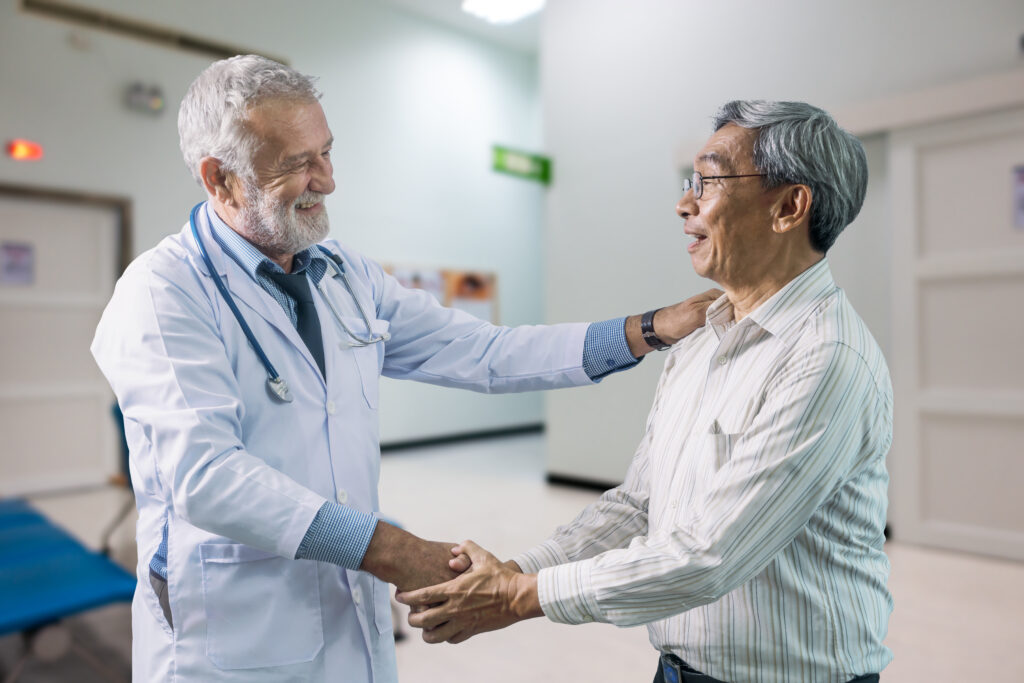

What are the Risk Factors for BPH?
There are several factors that increase the risk of developing Benign Prostatic Hyperplasia (BPH), which is an enlargement of the prostate. The prostate is, in its normal size, a walnut-shaped gland that does not typically cause issues for men until they are older. As men age, the prostate grows and may cause potential urinary symptoms that lead to the development of BPH. Although you can’t avoid certain risk factors that contribute to BPH, such as aging and family history, you may be able to lower your risk for the condition. Read more below to learn about BPH and the common risk factors.

Common Risk Factors of BPH
The most common risk factor for BPH is being male, age 50 or older. Family history, diabetes, heart disease, and an unhealthy lifestyle may also increase the risk.
Age
All men experience enlarged prostates as they age, and the risks increase with each decade. By the age of 50, approximately 50% of men will experience symptoms. By the age of 90, the percentage will have increased to 90%.
Family History
There have been findings of a possible genetic link to BPH. If any family members (blood relatives) have had a history of prostate problems or abnormalities in their testicles, this may increase your risk of developing BPH.
Obesity
A study that was published in the Journal of Urology found that men who are overweight, especially those with large amounts of abdominal fat, have a marked increase of developing BPH. Being overweight increases intra-abdominal pressure, which causes increased pressure on the bladder and intravesical pressure. This has the potential to cause BPH symptoms to worsen.
Lack of Physical Exercise
It is surprising, but lack of physical exercise can increase the risk of developing BPH. Scientific evidence is emerging, suggesting that a few hours of exercise per week may keep prostate enlargement under control.
Unhealthy Diet
Like many other conditions, daily consumption of a diet high in red or processed meat, saturated fats, and dairy products can increase your risk for prostate problems. Alcoholic and caffeinated beverages like coffee, tea, and soda can also increase your risk, due to being diuretics that increase urine production.
Medical Conditions
Medical conditions, including type 2 diabetes, heart conditions, and circulatory conditions can significantly increase your chances of BPH and problematic symptoms. By maintaining a healthy lifestyle, you can reduce your risk of developing symptoms of BPH and lower your risk for other conditions that may contribute to your risk of developing prostate problems.
Who is at Highest Risk for BPH
Benign Prostatic Hyperplasia is considered a normal part of aging. It commonly occurs in men over the age of 50, and the chances of developing BPH increase steadily for every decade that follows. By the age of 70, approximately 70% of men will have BPH, with moderate to severe symptoms. By the age of 80, this increases to 80%. Ethnicity can also play a factor, as African American and Caucasian men are more at risk of developing BPH than Asian men. Men at higher risk include:
- Men, age 50 or older
- Men who have a family history of prostate problems
- Overweight men, especially men with belly fat
- Men who have an unhealthy lifestyle
- Men who smoke
How to Prevent BPH
Although there is no way to prevent Benign Prostatic Hyperplasia, there are certain lifestyle choices you can make to reduce your risk of developing BPH. Lifestyle changes, such as maintaining a healthy diet and weight, are the first step to treating and relieving BPH symptoms if you think you are at risk. You can also do the following to help reduce the effects of an enlarged prostate.
- Eat a healthy diet
- Get regular exercise
- Maintain a healthy weight
- Stop smoking
- Lower the amount of fluids you drink
- Do exercises to strengthen your pelvic floor muscles
Our Prostate Specialists
Our board-certified, affiliated prostate specialists in NY, are highly trained in the treatment of BPH. Their goal is to address uncomfortable urinary symptoms through Prostate Artery Embolization (PAE), a minimally invasive-image guided procedure.


